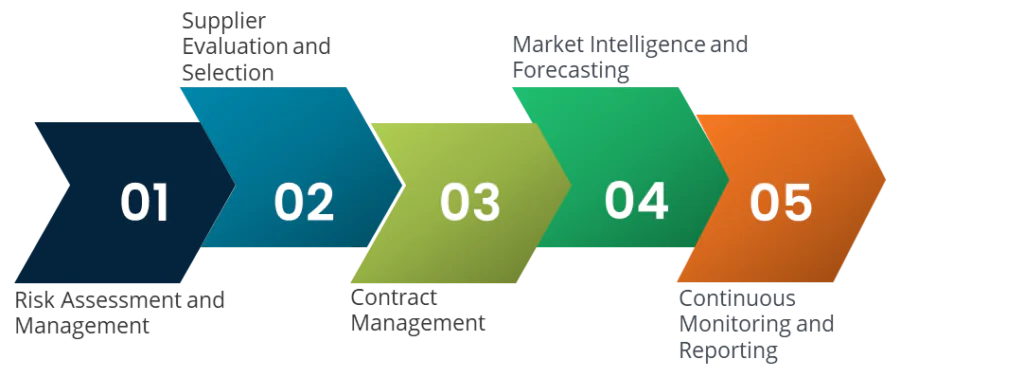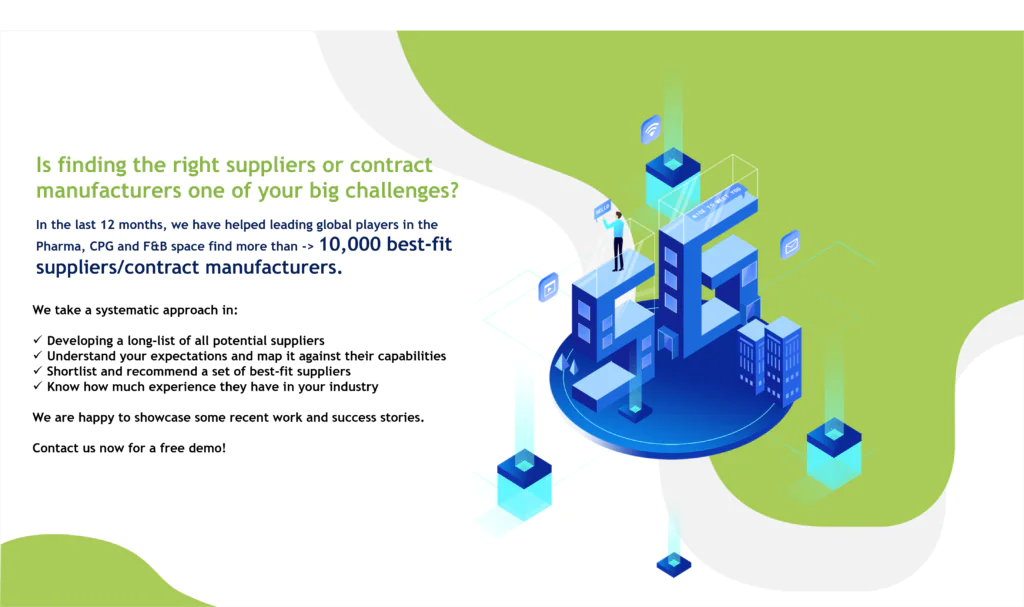By: Manpreet Kaur
Key Takeaways:
- The construction industry must ensure cost efficiency, quality assurance, timely acquisition, risk mitigation, and proper contract administration.
- Including inadequate needs assessment, vendor selection challenges, ineffective vendor management, liquidity constraints, compliance issues, procurement delays, probity risks, inefficient contract management, cost-benefit risks, and communication issues.
- Offer risk assessment and management, supplier evaluation and selection, contract management, market intelligence and forecasting, and continuous monitoring and reporting to help organizations mitigate procurement risks.
Risk management is a crucial activity that can greatly impact the success of an organization. It is the responsibility of managers to ensure that risk management is conducted effectively at all levels of the organization to enhance productivity and achieve objectives. In the construction industry, success is achieved through efficient operations, cost control, and effective management. Procurement plays a significant role in achieving these objectives.
Procurement is the process of sourcing, acquiring, and managing the goods and services required for a project. Construction procurement can be complex and time-consuming, requiring a comprehensive understanding of the project scope, necessary resources and materials, and the capabilities of potential contractors. To ensure the selection of a contractor who can deliver on project requirements, an effective procurement strategy is essential. An optimized construction procurement strategy or procurement route can save time and money, while also improving the overall quality of a construction project. In this blog post, we discuss effective procurement strategies for the construction industry, with a focus on procurement contractors and construction procurement.
For more details on SpendEdge services
Here are some common types of procurement approaches
Traditional Contracting:
In the traditional approach to contracting, the client directly hires a contractor to execute a project based on a negotiated contract. The contractor is accountable for acquiring and managing the necessary materials and suppliers required to complete the construction. This approach is suitable for smaller projects involving lower risks and limited complexity.
Design-Bid-Build:
The design-bid-build approach involves a client hiring a designer to create plans and specifications for their project. After the design is complete, contractors submit proposals and the client evaluates the bids. The contractor with the lowest cost is then selected to execute the project. This method is best suited for larger projects with longer timelines, as it allows for comprehensive planning and competitive bidding.
Design-Build:
The design-build method involves hiring a single entity (often a design-build firm) to handle both the design and construction aspects of a project. This approach simplifies the process by allowing the same team to manage both design and construction, leading to better coordination and efficiency. It is an appropriate choice for projects with tight deadlines or limited budgets, as it enables faster decision-making and execution.
Construction Management:
In the field of construction management, a construction manager is hired to supervise the entire construction project. From the initial phase to the final completion, the construction manager is responsible for managing all aspects of the project. This includes selecting and coordinating subcontractors, managing the budget, and ensuring that all the work is done according to the client’s specifications. A construction manager’s role is especially important in complex projects that require specialized contractors or multiple phases. By serving as a liaison between the client and the project team, the construction manager helps to ensure that the project progresses smoothly and that all parties are working together effectively.
Why strategic procurement is essential in construction?
Cost Efficiency:
Strategic procurement involves negotiating favorable terms with suppliers and sourcing cost-effective materials to reduce project expenses. Procurement professionals identify alternative suppliers and materials to manage project budgets more efficiently.
Quality Assurance:
Proper procurement ensures that the materials and services purchased adhere to the necessary quality standards. Procurement experts conduct quality control assessments and audits, working closely with suppliers to guarantee that products meet the project’s specifications.
Timely Acquisition:
Effective procurement strategies ensure that required materials and services are delivered according to the project’s schedule. Procurement professionals collaborate with suppliers to set delivery timelines and monitor shipments to avoid delays, helping the project stay on track.
Risk Mitigation:
Procurement specialists aid in managing risks related to construction projects, such as supplier financial instability or material shortages. They develop risk mitigation strategies and contingency plans to minimize the impact of potential disruptions on the project.
Contract Administration:
Efficient procurement involves managing contracts with suppliers effectively. Procurement professionals draft and oversee agreements to clarify terms and conditions, ensuring both parties understand their roles and responsibilities.
Supplier Relations:
Strong procurement includes managing supplier relationships effectively. Procurement experts evaluate supplier performance and cultivate partnerships with dependable suppliers, contributing to smoother project execution and reliable material delivery.
Some common procurement risks and their implications


Inadequate Needs Assessment:
Properly identifying and understanding the needs of a construction project is crucial for successful procurement. Misjudging requirements can lead to unnecessary expenses, wasted time, and resource mismanagement, impacting project success.
Vendor Selection Challenges:
Vendor selection carries obstacles such as poor quality, non-compliance, and unreliable delivery. Procurement managers must vet potential vendors based on experience, credit rating, and past performance to ensure reliable partnerships.
Ineffective Vendor Management:
Companies may encounter difficulties in managing costs, service quality, and risks without an efficient vendor management system. As a result, this could lead to an inefficient utilization of resources that may impact project outcomes and organizational growth.
Liquidity Constraints:
Delays in funding can lead to liquidity challenges for procurement managers. Inadequate cash flow can limit purchasing capabilities, delaying project completion and affecting timelines.
Compliance Issues:
Project setbacks can occur due to noncompliance caused by vendor delays, shipping issues, and production problems. Managing this risk can be done by implementing standardized processes and ensuring appropriate vendor selection.
Procurement Delays:
Delays can result from poor planning, bureaucratic approvals, extended negotiations, and supplier selection processes. Streamlining internal processes and establishing efficient systems can help mitigate delays and improve project delivery.
Risk of Probity:
Shortcuts in procurement can lead to questionable practices such as unauthorized purchases or dark purchases. Upholding legal and transparent procurement practices, even in urgent situations, is essential to ensure integrity.
Inefficient Contract Management:
Poor contract management can result in increased costs, delays, and subpar delivery. Effective management involves comprehensive decision-making, performance assessment, and risk mitigation.
Cost-Benefit Analysis Risks:
Cost-benefit risks occur when the projected benefits of a decision fail to materialize due to high associated costs. Conducting comprehensive cost-benefit analysis can help procurement managers make more informed decisions.
Communication Issues:
Inadequate communication among groups, suppliers, and other stakeholders may compromise the procurement procedure. Coordination and results may be enhanced by creating open lines of communication and guaranteeing mutual understanding amongst all stakeholders.
Request a free trial of our services at SpendEdge that can help you with procurement
How our SpendEdge services can assist in procurement risk mitigation?

Risk Assessment and Management:
SpendEdge conducts thorough risk assessments to identify potential risks in your procurement process. Our experts analyze various factors such as supplier reliability, market conditions, regulatory compliance, and supply chain vulnerabilities to develop effective risk management strategies.
Supplier Evaluation and Selection:
We assist in vetting and selecting reliable suppliers through in-depth analysis of vendor capabilities, performance history, financial stability, and compliance with industry standards. By partnering with reputable suppliers, you can minimize the risk of quality issues, delivery delays, and non-compliance.
Contract Management:
Our contract management services ensure that contracts with suppliers are clear, comprehensive, and enforceable. We help negotiate favorable terms, define key performance indicators (KPIs), and establish mechanisms for monitoring compliance and resolving disputes, thereby reducing contractual risks.
Market Intelligence and Forecasting:
SpendEdge provides actionable market intelligence and forecasting insights to anticipate market trends, pricing fluctuations, and supply chain disruptions. By staying ahead of market dynamics, you can proactively adjust procurement strategies to mitigate risks and capitalize on opportunities.
Continuous Monitoring and Reporting:
We provide ongoing monitoring and reporting to track key procurement metrics, performance indicators, and risk indicators. By leveraging real-time data analytics and dashboards, we enable proactive risk management and decision-making, ensuring agility and resilience in procurement operations.
Conclusion
To ensure successful construction projects, it is crucial for organizations to implement effective procurement strategies and risk management practices. By carefully considering the key factors that affect procurement risks and adopting strategic procurement approaches, companies can maximize project outcomes while minimizing potential disruptions. With SpendEdge’s specialized services, businesses can improve their procurement processes and make informed decisions that lead to project success.

Get in touch with our professionals and see how it helps your business
Author’s Details
Manpreet Kaur
Assistant Manager Presales – Sourcing and Procurement Intelligence
Manpreet is a presales specialist at Infiniti Research and has expertise in sales, business strategy execution, and innovative solution design. She is actively involved in supporting clients from F&B, CPG, Healthcare, Pharma, Chemicals, BFSI, Oil & Gas and Automotive sectors.




